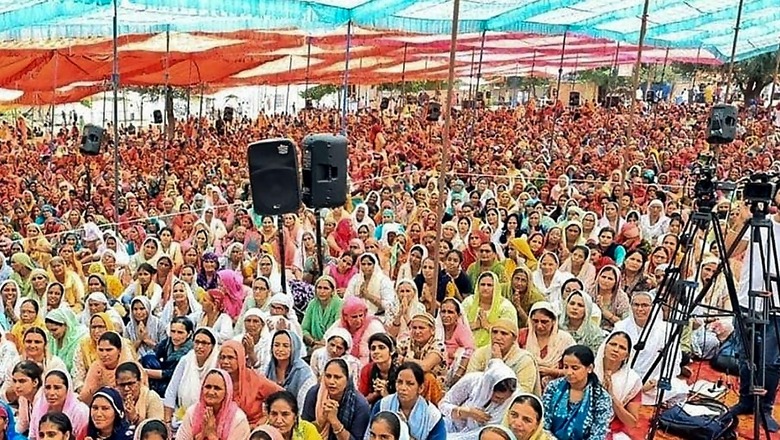
views
India is a deeply religious country, revered for its true saints, whose wisdom, purity, detachment, knowledge, selflessness, and obvious divinity are unquestioned. Among them are Adi Shankaracharya (8th century CE), and in more recent times, spiritual giants such as Swami Ramakrishna, Swami Vivekananda, Dayananda Sarasvati, Ma Anandmayi, Maharshi Ramana, and Sai Baba of Shirdi. All these saints lived in dignified simplicity, guiding disciples to find inner peace and experience the bliss of moksha.
However, simultaneously, a whole spectrum of so-called godmen (and women), who revel in their wealth, have also proliferated. Their emergence is a complex phenomenon, where class, caste, superstition, money, politics, and the hierarchical and exploitative structure of our society intertwine.
The list of such faux godmen is long, but it would be sufficient to mention only the most notorious. The latest one in the news is Narayan Sakar Hari, also known as ‘Bhole Baba’. 18 years ago, his name was Suraj Pal. He was a constable with the UP police, but was suspended for sexually harassing a woman in Etawah. He then transformed into a religious preacher who claimed to perform miracles, including reviving a dead girl, for which he was briefly arrested in 2000. Soon, he acquired a string of palatial ashrams and a fleet of luxury cars.
Just a few days ago, at one of his ‘satsangs’, where he was dressed in his trademark white suit, tie and expensive sunglasses, 121 people died in a stampede, of which 108 were women and children. The stampede occurred because Bhole Baba urges his followers to collect the dust he walks upon. Since the crowd was huge—an estimated 250,000 people against the administrative sanction for 80,000—a mad melee followed, with the organisers completely ill-prepared to handle the situation. As people were dying and screaming, Bhole Baba left the venue like a head of state, his car escorted by dozens of black-uniformed ‘commandos’ on motorcycles.
Another self-styled guru, Asaram Bapu, with millions of followers and hundreds of ashrams worldwide, was given a life sentence in 2013 for raping a 16-year-old girl at his ashram in Jodhpur. He is also facing trial for another rape case committed in Gujarat. Nine witnesses have been attacked in the past, and three killed. His son, Narayan Sai, is also under arrest for rape, and his wealth is estimated to be Rs 5000 crore.
Others of this ilk include Gurmeet Ram Rahim Singh of Dera Sacha Sauda, headquartered in Sirsa, Haryana. Known for his ‘rockstar’ image, gold jewellery, expensive watches, and luxury motorbikes, Singh was sentenced to 20 years in prison in 2017 for raping two women disciples. Two years later, he was found guilty of two charges of murder. Rampal, another self-proclaimed godman operating out of a huge 12-acre ashram in Hisar, Haryana, is imprisoned on charges of murder, attempted murder, and sedition.
Nithyananda of Tamil Nadu, who reportedly claimed he could delay the sunrise for forty minutes and make cattle speak in Sanskrit and Tamil, was charged and arrested after a video surfaced allegedly showing him in a sexual act with a film actress. Released on bail, he fled the country and is now believed to be on an island near Latin America, in a ‘country’ he has named ‘Kailasa.’ The list of such gurus is much longer, but these examples suffice to illustrate the point.
The question is: how do these godmen attract—and, more importantly, retain—followers? Interestingly, a significant number of their followers are Dalits and those from extremely backward classes. Bhole Baba himself is Dalit. Dalits also form a large portion of Ram Rahim’s followers, including those from Punjab (which has India’s largest Dalit population), who suffer despite the egalitarianism promised by Sikhism. For Scheduled Castes, Scheduled Tribes, and Other Backward Classes, who continue to experience discrimination from upper castes, such godmen provide an alternative, relatively caste-neutral, religious structure. Due to their large followings among these large demographic groups, politicians often give them considerable leeway.
It is not a coincidence that while the organisers have been arrested or charged, Bhole Baba has been given a clean chit by the UP administration, and is still absconding. Ram Rahim, incarcerated for life for rape and murder, was released on extended paroles nine times by the government. Rampal refused to comply with the order of the Punjab and Haryana High Court, and when his ashram was forcefully evacuated, five people died in a violent protest.
Godmen like these prey on the gullibility of largely the poor and the deprived. Their claim to perform miracles is the magnet. Poverty and illiteracy are their key allies. The oppression still inherent in the caste structure, and the promise of an alternative system of faith and worship is their attraction. Immense wealth is their armour, and for their devotees, their flamboyant lifestyles provoke awe, not censor. Lastly, political patronage shields them from accountability.
In such a situation, the solutions to this malaise cannot simply be legalistic. It requires introspection on the kind of society we are, and the foundational socio-economic reforms that are still incomplete, and need to be expedited.
The author is a former diplomat, an author and a politician. Views expressed in the above piece are personal and solely that of the author. They do not necessarily reflect News18’s views.




















Comments
0 comment